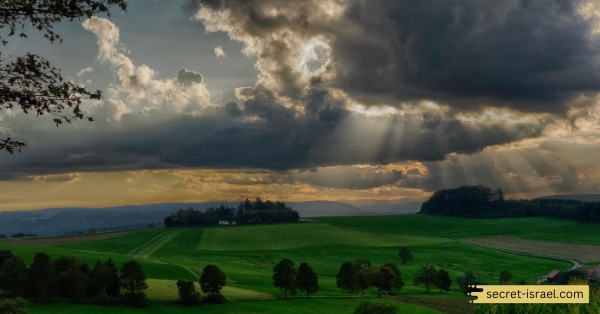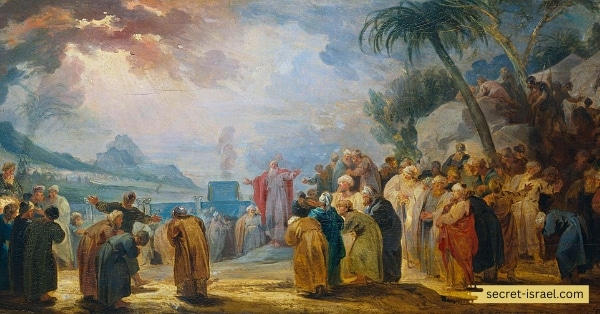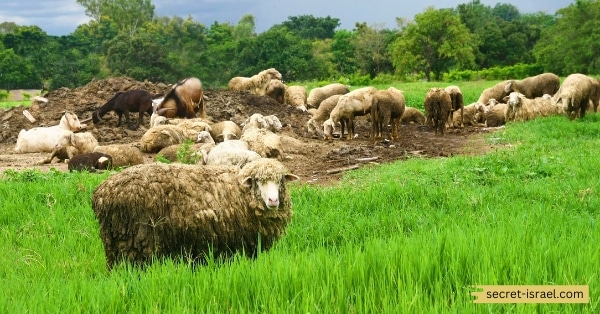“The Land of Milk and Honey” is a biblical nickname for Israel, symbolizing its fertility and abundance. It reflects the promise of a prosperous life in a bountiful land. Today, it continues to embody Israel’s cultural identity and national pride, reflecting its rich history and the enduring spirit of its people. Responsible exploration of this land involves respecting local customs, sustainability, and socio-political sensitivities.
So come join us as we journey back to biblical times and discover why Israel is known as The Land of Milk and Honey!
The Biblical Roots of Israel’s Nickname
Israel, often referred to as “The Land of Milk and Honey,” has a deep-rooted biblical history that extends beyond mere metaphor. This nickname, derived from the Book of Exodus in the Bible, symbolizes the fertility and abundance of this region, promised by God to the Israelites as they fled from Egypt.
The “milk” refers to the rich dairy products produced by the livestock grazing on Israel’s lush pastures, while “honey” represents the sweetness of dates, figs, and grapes grown in its fertile lands.
This phrase encapsulates the promise of a prosperous life in a bountiful land, and even today, it resonates strongly with the Israeli identity, underscoring their historical connection to the land.
Unraveling the biblical origins of this nickname sheds light on Israel’s ancient history, cultural richness, and the spiritual significance it holds for its people.

The Land of Milk and Honey: What Does It Truly Signify?
The nickname “The Land of Milk and Honey” is much more than a charming label for Israel; it carries profound symbolic significance. Rooted in biblical scripture, this phrase paints an image of a land overflowing with natural abundance, a place where survival isn’t just manageable but enjoyable.
The “milk” represents richness and sustenance provided by livestock, while “honey” symbolizes the sweetness and prosperity derived from the fertile lands. But beyond its literal meaning, this moniker also carries a spiritual dimension.
It signifies the divine promise made to the Israelites, a pledge of a prosperous homeland after years of hardship and wandering. Hence, it stands as a testament to their journey of faith and resilience.
Today, this phrase continues to embody the cultural identity and national pride of Israel, reflecting its rich history, bountiful resources, and the enduring spirit of its people.

How Israel Earned Its Sweet Moniker
Israel has been nicknamed “The Land of Milk and Honey” since Biblical times, a fitting title for a country that is rich in history, culture, and natural beauty. The origin of this nickname can be traced back to the story of Moses leading the Israelites out of Egypt and into the Promised Land.
In the book of Exodus, God promises that this land will be filled with abundance, flowing with milk and honey. Over time, this phrase has become synonymous with the land of Israel, as it is a land that has been blessed with fertile soil, ample rainfall, and an ideal climate for agriculture.
From the rolling hills of Galilee to the lush orchards of the Jezreel Valley, Israel remains a land of plenty to this day. However, beyond its agricultural blessings and sweet moniker, Israel is also a place of deep spiritual significance, a place where countless pilgrims and travelers have found solace and inspiration for thousands of years.

An Insight Into the Biblical Connection
The Holy Land, or Israel as it is more commonly known, has been referred to throughout history as “The Land of Milk and Honey.” This nickname is rooted in the ancient Hebrew Bible, specifically in the book of Exodus.
In this text, God promises to lead the Israelites out of slavery in Egypt and into a land “flowing with milk and honey.” The metaphorical language used in this passage suggests that the land would be bountiful and rich in resources, providing everything the Jewish people would need to thrive.
Today, the nickname remains a powerful symbol of the connection between Israel and its biblical roots. Understanding this connection allows us to appreciate the significance of the land to the Jewish people and its place in history.

Exploring the Land of Milk and Honey Responsibly
Israel, known biblically as “The Land of Milk and Honey,” is a fascinating blend of ancient history, rich culture, and diverse landscapes. However, with the increasing global interest in travel and tourism, it’s crucial to explore this beautiful land responsibly to preserve its unique heritage and natural resources.
Responsible tourism in Israel means respecting local customs, traditions, and religious norms. It involves understanding that every site, be it the ancient walls of Jerusalem, the sandy stretches of Negev, or the serene waters of the Sea of Galilee, holds deep cultural and historical significance.
Moreover, it’s about acknowledging the importance of sustainability. This includes supporting local businesses and artisans, choosing eco-friendly travel options, and minimizing waste. For instance, when visiting natural reserves or national parks, travelers should follow the ‘leave no trace’ principle to protect the environment.
Additionally, responsible exploration of Israel should also consider the socio-political sensitivities of the region. Tourists should strive to educate themselves about these issues, promoting understanding and respect for all communities.
Exploring the Land of Milk and Honey responsibly not only enhances the tourist experience but also contributes to the preservation of this extraordinary land, ensuring its treasures can be enjoyed by future generations.

In conclusion
Exploring the biblical origins of Israel’s nickname, “the land of milk and honey” sheds light on the richness and abundance of the land’s agricultural capabilities during ancient times. The phrase is mentioned multiple times in the Old Testament, indicating that it stood as a symbol of the Israelites’ promised land.
While milk and honey might seem like basic commodities, they were often associated with wealth and prosperity in that era, denoting the livelihood and high standard of living that awaited the ancient Israelites once they reached their destination.
By digging into the roots of Israel’s land of milk and honey, we gain deeper insight into the country’s fascinating history and discover the profound connection between the Israelites and their land.












